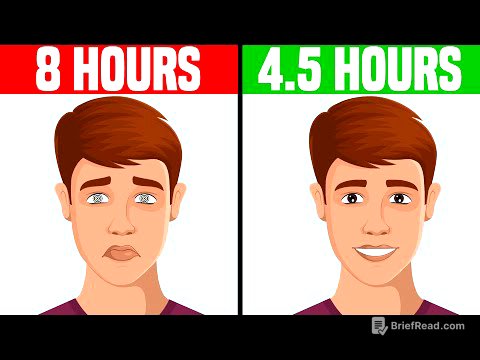TLDR;
Okay, so this video is all about melatonin, innit? Thomas talks about whether melatonin supplements are safe, what dosage is ideal, and how to boost melatonin levels naturally. Key takeaways include:
- Melatonin supplementation can be safe and effective for short-term use, especially when aligned with your natural sleep-wake cycle.
- Boosting melatonin naturally through fiber, hot baths, tart cherry juice, and sunlight is ideal.
- As we age, melatonin levels decline, making these strategies even more important.
Intro - Is Melatonin Supplementation Safe? [0:00]
Thomas shares his personal experience with sleep problems when he was overweight and how he relied on melatonin. He expresses concern about the potential negative feedback loop that long-term melatonin supplementation might create, where the body stops producing it naturally. He highlights the difference between the quarter milligram of melatonin the body naturally produces and the 1 to 10 milligrams found in most supplements.
Safety & Efficacy of Melatonin - Meta-Analysis Results [1:28]
Thomas discusses a systematic review and meta-analysis published in the Journal of Complementary Therapies in Medicine that looked at the safety and efficacy of melatonin supplementation. Out of 50 studies, 26 showed no adverse effects, while 24 showed at least one, but these were mostly short-term. The study suggested that adverse events could be mitigated by taking melatonin in line with natural circadian rhythms. Another meta-analysis in CNS Drugs also found melatonin generally safe and effective, with only short-term negative effects like sleepiness, dizziness, or headaches.
What Dose of Melatonin is Ideal? [3:10]
A 2022 meta-analysis in the journal Neurology found that 2 to 10 milligrams of melatonin supplementation improved overall sleep quality and duration in adults with various diseases, including metabolic dysfunction, anxiety, asthma, and sleep disorders. Another 2019 meta-analysis found that melatonin increased total sleep time by 30 minutes.
How to Naturally Boost Melatonin Levels [4:27]
Thomas transitions to discussing how to support natural melatonin levels, especially as people age and melatonin production declines.
Fiber & Gut Health for Melatonin [4:37]
Consuming more fiber is crucial for gut health, which in turn affects melatonin levels. A 2021 study in Scientific Reports found that higher levels of short-chain fatty acids (SCFAs) in feces were associated with poorer sleep. SCFAs, like butyrate, propionate, and acetate, are byproducts of fiber being broken down by bacteria. High levels of SCFAs in feces indicate that these beneficial compounds are not being absorbed and utilized by the body. Fiber breaks down into SCFAs, which bind to receptors on enterochromaffin cells in the gut, leading to serotonin production. Fiber also induces tryptophan hydroxylase expression, which is needed to convert tryptophan into serotonin.
Try SEED's Daily Synbiotic - Use Code 'THOMAS15' for 15% Off [6:52]
Thomas recommends focusing on eating fiber for gut health. He also suggests Seed's Daily Synbiotic, which contains both prebiotics and probiotics in a capsule designed to withstand stomach acid. He provides a discount code for viewers.
As We Get Older, Melatonin Levels Decline [7:34]
As people age, melatonin levels decline, and cells become more damaged, leading to increased inflammation (inflammaging).
How Melatonin Helps Aging [7:50]
Melatonin can improve mitochondrial efficiency, protecting mitochondria from damage and reducing the release of harmful particles. It also suppresses interleukin 1 beta, interleukin 18, and tumor necrosis factor alpha, modulating the inflammatory response associated with aging. Additionally, melatonin can prevent excitotoxicity in the brain by neutralizing the negative effects of excessive glutamate.
Hot Bath for Melatonin [9:27]
Taking a hot bath can improve sleep. A study in the Journal of Sleep Medicine found that 10 minutes in a hot bath (104-109 degrees Fahrenheit) improved sleep quality. The cooling effect after getting out of the bath triggers the release of melatonin from the pineal gland.
Tart Cherry Juice for Melatonin [10:19]
Consuming tart cherry juice can increase melatonin levels. A study in the European Journal of Clinical Nutrition found that people who consumed tart cherry juice had higher melatonin levels and improved sleep parameters. Another study in the American Journal of Therapeutics, using polysomnography, found that consuming 240 milliliters of tart cherry juice twice daily for two weeks increased overall sleep time by 84 minutes. This may be due to increased procyanidin levels (vitamin B2) in the brain, which modulate inflammatory markers, and increased tryptophan availability.
Getting a (safe) Amount of Sunlight During the Day [12:53]
Getting sunlight during the day is important for vitamin D production, which is linked to sleep. A study in PLoS One correlated low vitamin D levels with poor sleep. While vitamin D supplementation above restoring natural levels may not improve sleep, a study in Nutritional Neurosciences found that it improved some markers of sleep. Vitamin D binds to a response element on tryptophan hydroxylase genes, which activate the enzyme that converts tryptophan into serotonin and then melatonin.
Recap & When to Use [15:22]
Thomas summarizes the key points: prioritize natural ways to boost melatonin levels, consider tart cherry juice as an intervention, and use melatonin supplementation as a temporary measure, such as when traveling or to align with the body's natural melatonin release.









